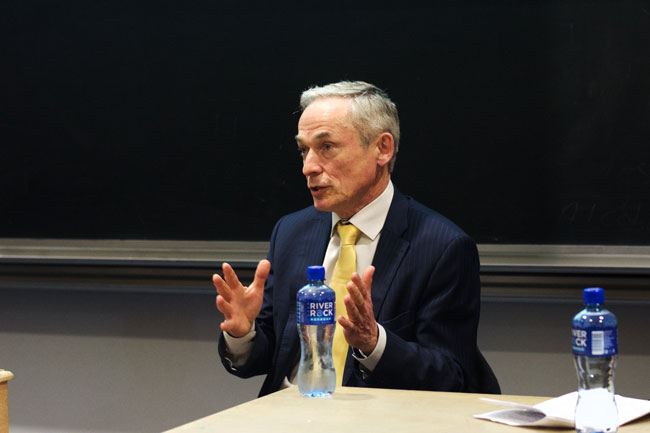A new higher education funding model should be in place for the 2018 Budget, according to a new plan published today by the government. The commitment comes less than six months after the Action Plan for Education outlined the second quarter of 2017 as the timeline for a model.
The Action Plan for Education 2017, while short on detail, confirms comments made by the Minister for Education, Richard Bruton, to The University Times last year at a Trinity Young Fine Gael event, when he said that he hoped to have built a “consensus” on a new funding model by late 2018.
The initial timeline, of the second quarter of 2017, seems to have been abandoned as the cross-party Oireachtas Education and Skills Committee continues to discusses the report of the government’s higher education funding working group, published in July and is commonly referred to as the Cassells report, after its chair, Peter Cassells.
Since the publication of the report, which outlined three options for the funding of higher education – the abolition of the student contribution and the creation of a predominantly state-funded system, the continuation of the current student contribution charge coupled with increased state investment, and the introduction of an income-contingent loan system – Bruton has repeatedly emphasised the need for consensus behind any new funding model for higher education.
The Action Plan for Education 2017 also contains a number of other commitments, including a planned policy review to design and implement a “multi-annual funding model”. The plan states that the aim is for the new model to involve increased state funding and increased employer contributions, which have been two of the recurring themes of the debate on higher education funding. Speaking at the Oireachtas Education and Skills last year, student groups and trade unions called for any new funding model to include an increased employer contribution, as recommended by the Cassells report.
These groups along with experts, such as Peter Cassells and heads of all seven universities across Ireland, spoke about the significance of increased government funding in higher education will be to any new funding model that is developed.
While there are three options recommended by the report, Cassells has suggested that any new model could be a “hybrid”, including elements from each of the three models. Bruton seems to support this, telling The University Times in September that, with Fine Gael as a minority government, “some form of compromise is always going to have to be there”.
This desire for consensus, however, has already faced criticism. Speaking to The University Times late last year, a number of TDs and senators expressed concern that it would prove difficult to “bridge the differences of political opinion” on the Oireachtas Education and Skills Committee which, over the last several months, have heard from trade and student unions, university heads and the employers group Ibec, as they consider the working group report.
The plan also sets out the fourth quarter of 2017 for the enactment of the ambitious Technological Universities Bill, which will formalise the creation of the technological universities in Ireland, although it notes that the timeline of the bill is dependent on “government legislative priorities”.







